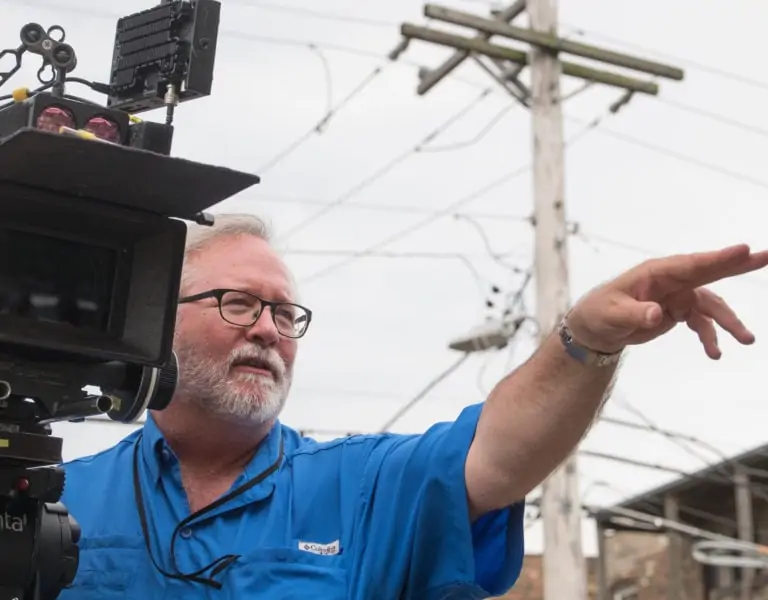Home » Features » The Bigger Picture »
GREEN LIGHT
The UK declared a climate emergency in 2019 and is committed to reaching Net Zero by 2050. Crew members, studios, and rental companies discuss what is being done to reach that target in the film and TV industry.
In 2011, BAFTA founded an initiative called albert to support the film and TV industry “in reducing the environmental impacts of production and to create content that supports a vision for a sustainable future.”
“Our website (www.wearealbert.org) is a good place to start for some initial inspiration and advice,” says albert communications manager Genevieve Margrett. “You can also sign up for free training there. Making a production in a sustainable manner is a total team effort and should ideally be led from the top. Ask each department to consider its impact and how to mitigate it.”
“There’s no plan B, no planet B,” says Barry Bassett, managing director of albert-approved rental house VMI. In 2008, he made a new year’s resolution to cut his carbon footprint. Today, his business is on the verge of being fully carbon-offset, with a goal to reach Net Zero by 2030 (meaning emissions are reduced as far as possible and any residual is offset).


albert provides an offset scheme which helps productions balance their unavoidable emissions by supporting impactful projects such as rainforest conservation. The organisation also runs a certification programme. “One good example to share of a relatively recent production is Temple on Sky,” Margrett continues. “They achieved three stars [out of three]. Reasons for this included using 81% local crew; all costumes were either hired or taken from the costume designer’s stock; and props and production equipment were also re-sold to other productions to ensure re-use.”
A new role has emerged to take charge of these issues on a production: the sustainability coordinator. After 20 years working in the industry, Amelia Price set up her own consultancy, Sustainable Film, in this field. “We work with many production crew who are very knowledgeable about the subject and will implement green initiatives wherever possible, but they are often restricted by the time they can dedicate to the subject,” which is where Price comes in.
“The field of sustainability is also moving very quickly,” she continues. “We have a designated research assistant at Sustainable Film just to help us keep on top of emerging technology.”
Crew-led action
Jason Henwood works with a sustainability consultancy too, Creative Zero, but he is primarily a focus puller. “Sustainability shouldn’t be the role of any single person, it should simply be the job of every crew member on set,” he believes. “What we’ve found since the pandemic is a whole wave of crew-led initiatives taking place because we’re tired of this industry operating in the same old destructive ways, and crews on set are paving the way for change from the ground up rather than the top down.”
Henwood used the first COVID lockdown to collaborate with other BECTU technicians on “Working Sustainably within Camera”, a PDF full of advice about how camera departments can reduce their environmental impact, downloadable from camerabranch.org.uk/sustainability.
“The environment has been important to me since the ‘60s,” says Nic Knowland BSC, a keen advocate for green policies in the film and TV industry, and a member of the BECTU Sustainability Committee. He reports that these issues increasingly figure on the BSC’s agenda too, with plans to form a dedicated committee for them.
Cut It is another crew-led initiative to develop and implement actions against the climate crisis “be that through cultural change, policy change or both.” Co-founder and DP Sarah Cunningham told British Cinematographer last year that “what has been so inspiring about Cut It is the realisation that so many people, from producer to trainee, agent to gaffer, do in fact care.”
Henwood also founded the Rental House Sustainability Group three years ago when he was trying to persuade companies to stop packaging items in single-use plastics. He worked up to bigger issues, chairing roundtable discussions. “We‘ve pushed for companies to change their energy providers to those with better environmental credentials, partner up with albert, adopt electric or HVO fuels, have sustainability audits carried out, adopt green policies, agree to Green Pledges, and work more closely together on issues.”
Renting sustainably
“I thought that achieving sustainability was going to be expensive for us,” Bassett of VMI admits, but his research led him to a Harvard study showing that companies with strong ESG (environmental, social, governance) policies tend to be more creative and make more money. “That has absolutely been what we have found,” he confirms.
VMI has enacted a raft of sustainability initiatives, from stocking “green” gaffer tape and sourcing reusable alternatives to poly-board, to sending zero waste to landfill and offering staff an extra day’s holiday if they don’t fly. In recognition of this, and the managing director’s efforts to push sustainability to the top of other companies’ agendas, Bassett and VMI have won awards including Hero of Net Zero at last year’s COP26 climate summit, and Park Royal Business of the Year 2022.
VMI retired all its tungsten lighting fixtures last autumn. “The thing is, tungsten isn’t lighting,” argues Bassett. “96% of the energy comes out as heat. I’ve had some slightly concerned words from BSC members to say, ‘But they’re really good because they give such an even colour.’ I know this, but what we’re trying to do is help people to start thinking differently.”
“The early tungsten-versus-LED lighting argument was mostly about the rendering of skin tone,” says Nic Knowland, “but the current generation of LED and other power-efficient lighting equipment is now so good that we can enjoy good skin tones as well as all the other advantages of mobility with onboard batteries, colour looks with no gel changes, and dimming with no colour shifting. And of course there are digital cameras available with undreamt-of ASA capability, so we’re able to use less light anyway.”
Power sources
At Sustainable Film, Price urges crews to think about where their power is coming from and consider alternatives to generators: “Talking to the studio or location you are shooting in and assessing if there is enough ‘house power’ to use can greatly reduce CO2 emissions. If this isn’t available then even by asking the question you are putting pressure on those responsible to provide enough power.”
For productions serious about helping the planet, Knowland recommends enquiring whether a studio’s electricity supplier is truly renewable, as some suppliers may actually be selling fossil fuel power with a double-counted RECO (Renewable Energy Certificate of Origin). albert is currently partnered with Good Energy and can help companies switch to this genuinely renewable supplier.
Ealing Studios is just one organisation that has taken up this offer. They have also banned diesel generators from their site, installing external 63A and 125A three-phase sockets for production units to hook into. “Ealing Studios has been working with albert on how UK studios and productions can switch to more sustainable methods of working without it being costly,” says studio manager Charlie Fremantle. “Good neighbourly relations matter to us, whether they are next door or the other side of the world.”

The studios have recently installed six 21kW charging points for electric vehicles, with hopes to expand this. “The technology landscape continuously evolves, and so we revisit plans on a regular basis,” Fremantle notes. “For example, replacing heating systems now include options that were not available or practicable last year. This is not a destination but a journey of continual change.”
LED volumes can offer significant carbon reductions over location work. “Virtual productions make it possible to create almost any type of location and atmosphere for an unlimited period of time,” says ARRI’s Stephan Schenk, general manager, global sales and solutions. “In addition, travel to remote locations can be reduced to a minimum and elaborate set builds can be replaced by the rendered representation on an LED wall. All of this saves resources and reduces emissions while offering greater efficiency.”
Generating change
But for most productions, location filming remains the norm. “The local councils have seen a huge increase in complaints from filming generators,” notes Price. “Utilising hybrid generators is a quick way to bring down our emissions or select a genny that can take HVO fuel.”
Pixipixel has switched all its generators and vehicles to HVO (Hydrotreated Vegetable Oil), which is synthesised from waste cooking oils and emits a tenth of the carbon of conventional fuel. “Because it’s 100% biodegradable and non-toxic, HVO causes less pollution,” managing director Steve Knight explains, “so we would expect crews to notice our generators produce fewer fumes, and hence air quality on set will improve compared to using traditional diesel.” He adds that fuel costs and performance are unchanged.
“Last year, Pixipixel provided the generators and lighting equipment for the upcoming See-Saw Films series The Essex Serpent for Apple TV+, and HVO fuel was specified for the production,” Knight continues. “This was great, and we hope other productions and rental companies follow this example.”
Reducing the running time of generators is important as well. “There’s an awful lot of emissions going up there for no use,” Knowland comments.


Chris Brown, group transport manager at Panavision and Panalux, confirms this. “What we’ve consistently seen is that a production will take a 200kW diesel generator, and for ten hours of the shooting day it supports between 5-20kW, and for an hour and a half or two hours that goes up to 40 or 60kW – but for the entire day, they’re running the 200kW engine.” The rental house responded by introducing the h40, a hybrid generator which cuts the typical running time by over 75%, and the i-Series, which are battery-only units for lower-wattage use.
Mark Furssedonn, managing director of Panalux, believes that gaffers must adapt too. “At the moment we still see the historical behaviour of wanting a 200kW generator even though the production is using modern LEDs that consume only a fraction of the power. It’s understandable – gaffers never want to be caught unprepared for whatever the cinematographer might ask of them on the day – but that’s one of the key challenges to moving away from traditional diesel generators.”
What advice would Knowland give to crew concerned about sustainability? “I would particularly challenge the HODs of all departments, especially the camera dept, to inform and empower themselves as it’s in everybody’s interest to take responsibility for this. And if you’re working on a production seeking albert certification, make sure to find out who the person in charge of this on the production is, and say hello and positively engage. And to all crew, I would say join BECTU, join Cut It, and any other organisations that are fighting climate change and wanting social justice and a sustainable work-life balance. Remember, small changes can all add up.”
Jason Henwood is hopeful about the future: “This year is going to be very exciting in regard to seeing positive change and our industry being cleaned up. We’re not only seeing groups forming that are dedicated to sustainability, but companies actively employing sustainability coordinators to help reach that Net Zero target earlier than 2050.”

















